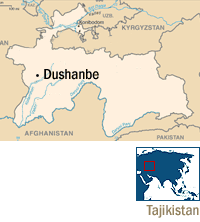 Securing their independence from the Soviet Union in 1991, the Central Asian republics of Uzbekistan, Kazakhstan, Tajikistan, Turkmenistan and Kyrgyzstan, with a total population of almost 59 million, cover an area of 1.5 million square miles. The region is rather diverse ethnically in spite of the similarity in language and religion. Most people identify with the religion of Islam, while a minority identify with the deeply rooted and historic Russian Orthodox Church.
Securing their independence from the Soviet Union in 1991, the Central Asian republics of Uzbekistan, Kazakhstan, Tajikistan, Turkmenistan and Kyrgyzstan, with a total population of almost 59 million, cover an area of 1.5 million square miles. The region is rather diverse ethnically in spite of the similarity in language and religion. Most people identify with the religion of Islam, while a minority identify with the deeply rooted and historic Russian Orthodox Church.
Tajikistan is a small, impoverished country. Like the other former Soviet republics in Central Asia, it faces serious economic challenges in its transition from a centrally planned to a free-market economy. However, it must tackle the added hardship of rebuilding after a devastating five-year civil war (1992-1997). With much of the country’s industrial base either bankrupt due to the collapse of the Soviet Union or abandoned due to the civil war, approximately one-third of the male population migrates to Russia for nine months of the year looking for work. Many return with money for their families, but an increasing percentage of them are also bringing back sexually transmitted diseases and HIV/AIDS.
Because of its limited natural resources Tajikistan was more dependent on the government than were other Soviet republics. The country not only lacks experience in producing enough to be self-sustaining, but the concept of community self-help to address critical needs in health, education, and economics remains mostly non-existent. Since the Soviet government strove to provide for people’s needs and discouraged self-help, they were not empowered to solve their own problems.
The PC(USA) is endeavoring to discern how to serve in this area in a post-Soviet era. It relates to the emerging churches and a few development agencies as they struggle to forge new national identities.
Dating back to the early 1990s, the PC(USA)’s engagement in Central Asia is the enactment of its commitment to Christian witness. It remains concerned with the societal and economic vulnerability resulting from the disbanding of the U.S.S.R., the harmful aspects of globalization, the geopolitical instability and the lack of ethnic and religious tolerance. Therefore the PC(USA)’s strategic commitment with its partners in the region is to empower mutually transformative ministries with an emphasis on holistic ministries communicated through community development and a dynamic interfaith dialogue. The obstacles to transformation are great, but a team of mission workers believe the community can be mobilized and given hope to step up and make a difference.
